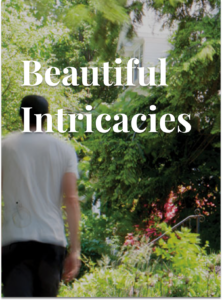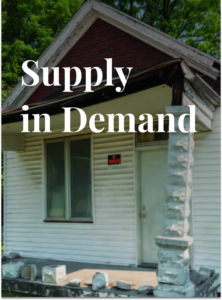Home is .
BY JOSH MOSS
EDITOR, LOUISVILLE MAGAZINE
Oct 19, 2022

In March 2020, not even a week into lockdown, my family and I walked up to Red Hog at the end of our old street in Crescent Hill to buy, of all things, toilet paper. The restaurant side of the butcher shop, like so much of our city, was closed, so the staff, knowing that store shelves were apocalyptically empty almost everywhere, had put out some household essentials (paper towels, hand soap, that TP). Only two customers were allowed inside at a time, and the guy ahead of me said he’d been all over town looking for ground beef. He bought six pounds from the dwindling meat case, his way of prepping for the uncertainty ahead. Earlier that day, at Kroger, I’d seen a father and his teenage son, both wearing gas masks, pushing a cart brimming with packages of meat, the man wiping down a gallon of milk with a disinfecting wipe.
In the parking lot outside Red Hog, Bri waited with our kids — Miles, who was three at the time, and his older sister, Emilia, who was in kindergarten. Our friend and neighbor John Nation, who for decades was the staff photographer at Louisville Magazine, was out with his camera, and he stopped to talk to us. He coughed. “Allergies,” he said. I lied to John, telling him we had covered the stroller with blankets because it was chilly outside, not because we were afraid of the virus. This was back in the initial unknown following March 13, 2020, Friday the 13th, which also happened to be the day Louisville police killed Breonna Taylor in her own home (though her name wouldn’t become local, then national, news for another two and half months). This was back when my family didn’t own any masks yet, back when we’d hold our breath when passing somebody on the sidewalk or cross the street to avoid them altogether.
Miles pushed the blankets aside, asked, “Where are we?”
John snapped some photos, and the other day I came across one of the images in an old email: Miles peering out of the stroller, taking in a world his young mind couldn’t have realized was changing. That was more than two and a half years ago, but we are still looking around like Miles, emerging and wondering: “Where are we?”
Earlier this year, Louisville Magazine, in collaboration with Louisville Public Media, set out to explore that question and more, under the theme: Home. Because home — our city, our neighborhoods, our households, ourselves — has changed.
We interviewed people from throughout (some from the same neighborhood), asking questions such as: How has your relationship with your home changed since March 2020? How has your relationship with Louisville changed since March 2020? Outside your house, where in Louisville do you feel most at home?
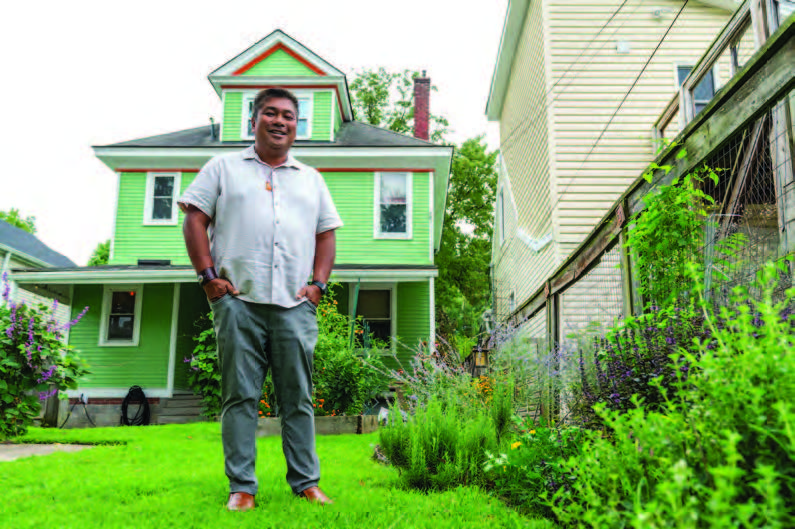
Joel Buno
executive director of Asia Institute-Crane House, lives in the Original Highlands.
What does “home” mean to you?
“As Cicero once stated: ‘If you have a garden and a library, you have everything you need.’”
How has your relationship with your home changed since March 2020?
“Hosting a lot less, if at all, since the pandemic began. But I still attempt to keep my home tidy and company-ready for whatever surprises may arise. I have completed lots of little projects — organizing closets and drawers — that I had been postponing. My home houses, safely, my husband and my 160-pound dog.”
If you’re not originally from Louisville, where was home before here?
“When I was six months old, we moved from Manila in the Philippines. Jersey City, New Jersey, via Chicago via Ashland, Kentucky. I have lived in Louisville longer than any other city. Louisville has a Northern sensibility with Southern charm. I can order both a sweet and an unsweet iced tea anywhere in the city.”
Brooke Martin
full-time college student pursuing her bachelor’s in human services and addiction with a minor in psychology, lives in the 40208 ZIP code
How has your relationship with your home changed since March 2020?
“Being a single mother of three and four months pregnant, while facing eviction, became my biggest reality. Homeless for nearly eight months, staying in an extended-stay hotel with two twin beds to fit four of us, was a nightmare. Generous donations from local charities and individuals in the Jefferson County community helped me and my children until we could help ourselves. Finally, I found a stable roof over our heads.”
In one word, home is .
“Stability.”

Natalie Harris
executive director of the Coalition for the Homeless, lives in St. Matthews
What does “home” mean to you?
“The base for stability, health, education, family, community, growth and comfort. And, unless we are willing to fight against unfair systems, it can also be the basis of segregation, debt, isolation and lost opportunities.”
How has your relationship with your home changed since March 2020?
“I spent much more time driving throughout the city to let people on the eviction docket know their rights and opportunities so they would not lose their homes.”
Gabrielle “Gabby” Demeary
beauty content creator, lives in Valley Station.
What does “home” mean to you?
“A place where I can feel safe, where I can go when I need peace."
How has your relationship with Louisville changed since March 2020?
“Very untrustworthy. I don’t trust cops anymore. I don’t trust authority. I’m very particular about which area to go to in the city. Being an African-American girl in Valley Station, I’ve had to balance being too Black for the white people, too white for the Black people.”
What’s something about your neighborhood you wish more people knew about?
“Just because you live in a predominantly white neighborhood doesn’t make you less Black.”
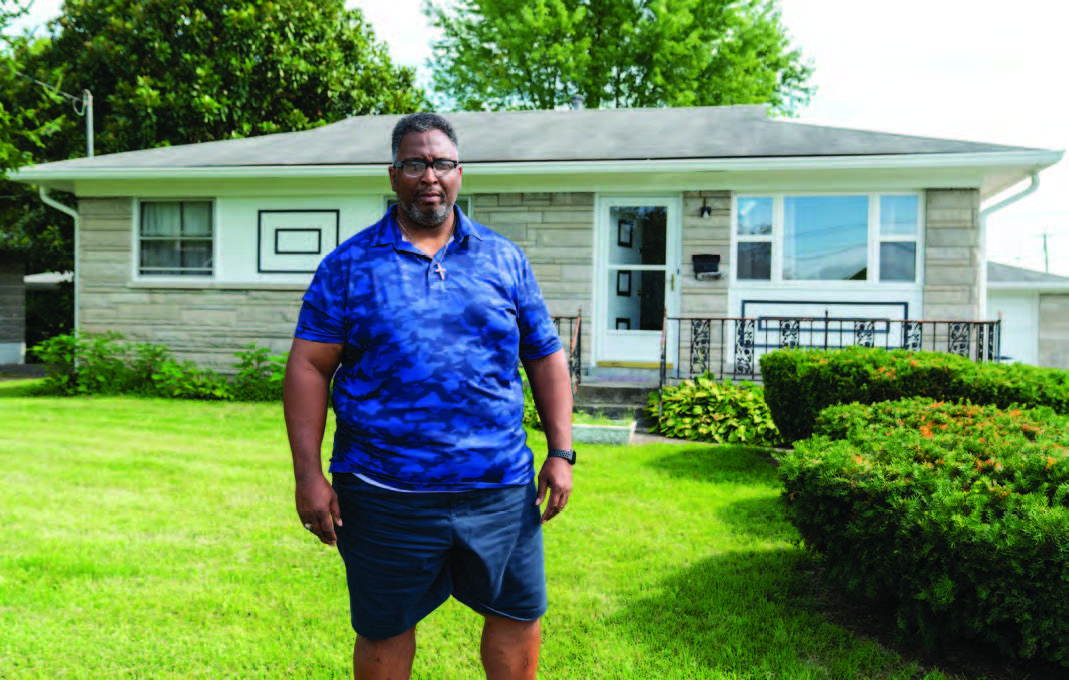
Kevin N. Wigginton
senior director of the YMCA New American Welcome Center, lives in Alpha Gardens in the West End.
How has your relationship with Louisville changed since March 2020?
“I love my city, but March 2020 showed us just how much work still needs to happen in our community as it relates to the (racial) divide that exists in Louisville. So much more has to happen before Home feels like Home again. The divide, which some have only recently noticed, has been in our community for as long as I can remember.”
Donald Taylor
licensed massage therapist and wellness podcaster, lives in Beechmont
How has your relationship with your home changed since March 2020?
“I try to have at least one room that is free of visual chaos and clutter, where I can go, close the door — if it’s a room with a door — and just be. To let out a long-held breath, to cry, to celebrate — just a space that is my oasis and retreat.”
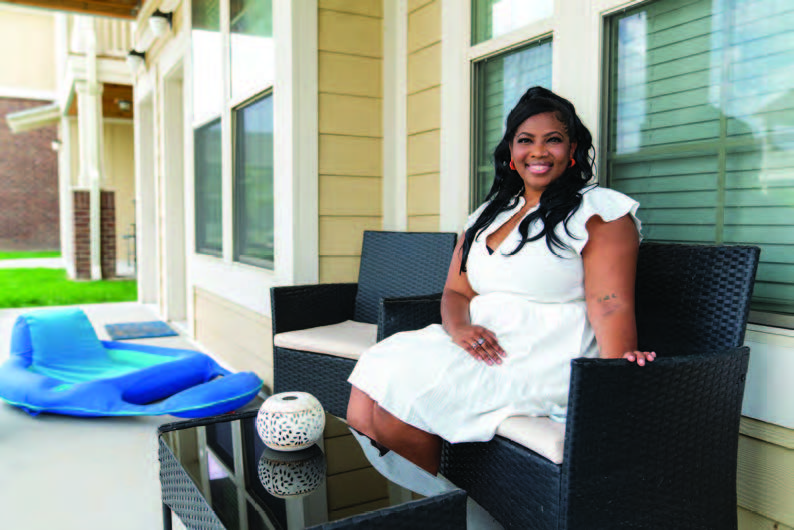
Millicent Cahoon
licensed therapist and Ph.D. student, lives in Westport
How has your relationship with Louisville changed since March 2020?
“My safety as a Black queer woman constantly feels compromised. Who can I run to for safety?”
Outside your house, where in Louisville do you feel most at home?
“I feel safe at NoraeBar on East Market Street, where I can sing my heart out during karaoke and be around so many LGBTQ people.”
Denisha Long
childcare provider, lives in south Louisville.
How has your relationship with Louisville changed since March 2020?
“Police are supposed to protect us, not hurt us.”
Taylor Simmons
library clerk, lives in Crescent Hill (by way of Valley Station, Okolona/Fairdale, St. Matthews, Shepherdsville, Hopkinsville…).
How has your relationship with Louisville changed since March 2020?
“I don’t think my opinions about the city have stayed the same at all. There were a lot of things about Louisville that I think longtime residents disliked about the city — in terms of wealth distribution, gentrification, food deserts, the budget for public services being cut — but I think COVID and Breonna Taylor’s death really brought the severity of those things to light. Which was necessary. The protests, to see the change that people collectively want for the city, made me feel hopeful when nothing else going on in the world did.”
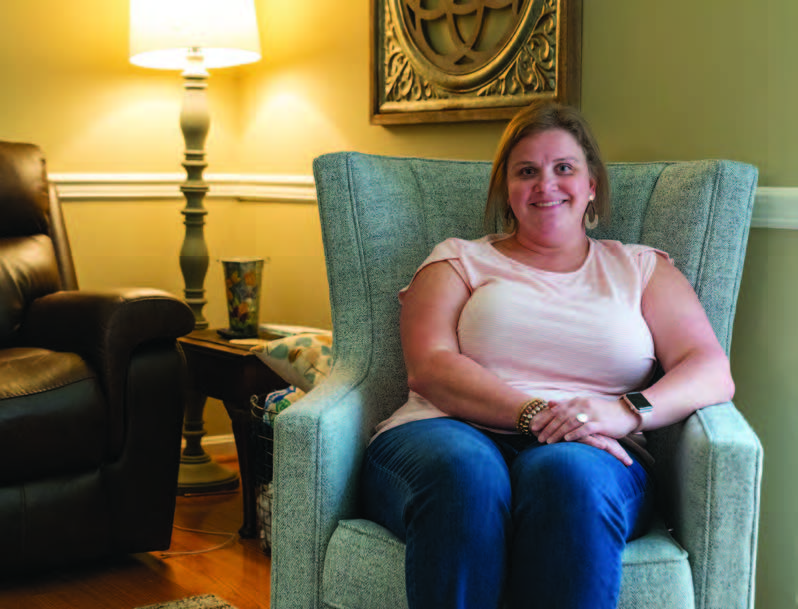
Kimbrough Gossett
registered nurse, lives in Lyndon.
What does “home” mean to you?
“Home is a safe place for me and my kitty to lay our heads.”
How has your relationship with your home changed since March 2020?
“After a fire in late 2019, in 2020 I lived in temporary housing with a friend, and then bought a new home. I felt upended and lost, like perhaps I didn’t have a home, until my college bff gave me that definition. Now, I think home is the people, and pets, that stand by you in trying times. The same people who carried me through the trauma of the fire also carried me through working in a COVID ICU.”
How has your relationship with Louisville changed since March 2020?
“I’m angrier with Louisville regarding the reactions to vaccinations and masking, with the places that spout political rhetoric from the pulpit. It’s hard to reconcile people telling you, ‘I wanted to get the vaccine, but my preacher said I didn’t trust Jesus,’ before they die.”
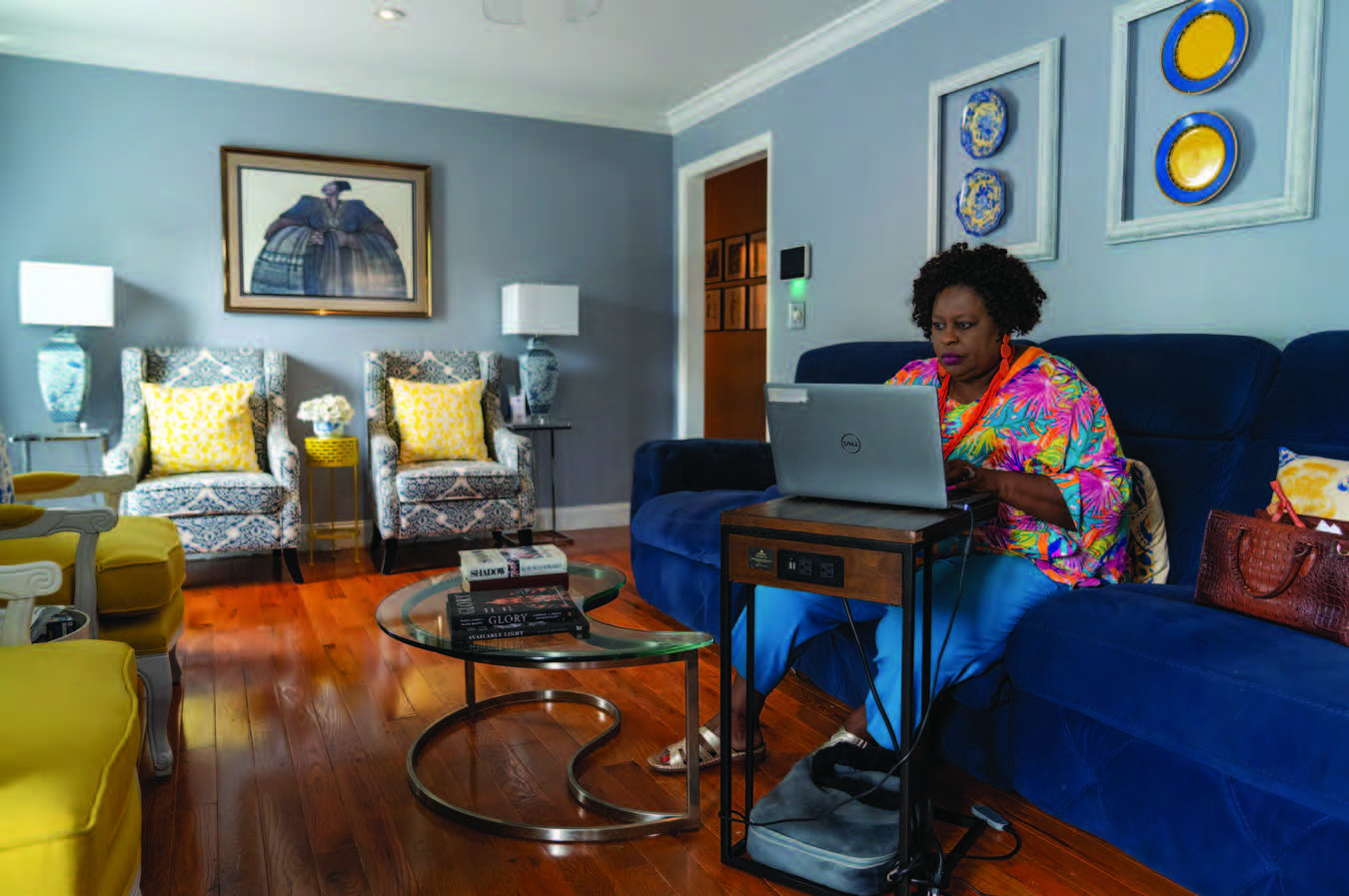
Paula McCraney
Metro Councilwoman, lives in St. Matthews
How has your relationship with Louisville changed since March 2020?
“I am more aware of our warts, flaws and scars. I have always been fully aware of racism, segregation and the dangers of a divided city filled with a disproportionate amount of the haves vs. the have-nots, but since March 2020, I have been personally exposed to the realities of our dark past and present.”
What does “home” mean to you?
“Sanctuary. I use that word intentionally because my home literally became a sanctuary, my holy place, for two years when my church was forced to deliver Sunday services online during the pandemic. Over time, worshipping in my den seemed normal. The pandemic revealed so much about our city. As a result of what we’ve learned about ourselves, we are trying to evolve into the compassionate city that we purport to be.”
Isaac Kleinman
lives in Wildwood.
What does “home” mean to you?
“I am nine years old, and for me, home means a break from school. Home means a time to rest. Home means a time to be free.”
Outside your house, where in Louisville do you feel most at home?
“At a park because I like to swing on the swings.”
Erica Rucker
arts editor at LEO Weekly, lives near Silver Hills in New Albany, Indiana.
What does “home” mean to you?
“The place where I grow things. Flowers, vegetables, my son, my relationships, my soul. It is a place for cultivation and contemplation.”
How has your relationship with Louisville changed since March 2020?
“Louisville is my hometown, and I expect and demand for it to be better. I criticize it strongly when it fails. I feel that Louisville has the potential to set a strong example for the nation in peace as it did in struggle.”
In one word, home is .
“Fertilizer.”
Jamie Friedman
retired JCPS teacher, lives in Oakland Hills (not too far from Mt. Washington).
How has your relationship with your home changed since March 2020?
“When I arrived back in Louisville on March 13, 2020, I didn’t know my relationship with my home was about to change. I spent most of the lockdown getting to know my home and doing a total redo of my landscaping. My backyard went from unusable to totally lovable.”
How has your relationship with Louisville changed since March 2020?
“I miss the restaurants, museums, festivals, art shows. I miss the pulse of the city. The ugly truth about Louisville’s refusal to address racism and discrimination has been brought front and center, where it always should have been. The city will pretend for a while it cares, then go right back to its racist roots.”
What’s something about your neighborhood you wish more people knew about?
“I wish I knew more about the people in my neighborhood. I think most people live in this neighborhood to escape community.”
We interviewed lots of our neighbors, from those with homerooms to those whose first home was in another country.
Here’s some of what those in home-related fields— builders, housecleaners, homeless-outreach workers, realtors, etc. — had to say.
How has your relationship with your home changed since March
2020? “I have spent more time on the front porch getting to know more of my neighbors.” — Hamilton
How has your relationship with your home changed since March 2020? “I have worked in the housing and homeless field for more than 20 years. I have never thought of myself as an essential worker until the pandemic started.” — Reif
How has your relationship with Louisville changed since March 2020?
“I don’t feel downtown is a safe place anymore. I worry about how the police are treated by the government and the community. I feel like safety and common sense took a back seat to other concerns.” — Esposito
How has your relationship with your home changed since March 2020?
“I’ve seen how difficult it has been over the last several years for many people to buy a home because of lack of inventory and affordability.” — Gulick
Outside your house, where in Louisville do you feel most at home?
“The Ohio River on my boat. It is the one place where I can go and have peace away from electronics. My phone will not work when I am on the river!” — Waller
How has your relationship with your home changed since March 2020?
“For those with safe, stable housing during the pandemic, our homes turned into our offices, classrooms, recreation areas and everything else. Our kitchen became an office, our dining area became a classroom. Like many people, my family spent more time in our home than we ever had before, which gave us an opportunity to look at our space and see what else we could do with it.” — Barber
What does “home” mean to you?
“Home is where I can hide. Home is where I can be free. At home, I am allowed to be happy or sad, to cry or laugh, to be excited, angry, prayerful, spiritual, ugly, beautiful, lazy and restful. My office feels like home, all decorated with my aesthetics. I may be more comfortable there than at home.” — Huntley
How has your relationship with Louisville changed since March 2020?
“We are a dangerous city with many gun deaths.” — Theraldson
What does “home” mean to you?
“This might sound crazy, but after going on vacation, when I come up the street and see my house, I feel so happy. She’s like a big ol’ hug.” — VanMeter
Do you feel at home in Louisville?
“No. Too much ‘political crap’ is in Louisville, where I come for work. I live in Cynthiana and love the peacefulness. I do not like crowds and big groups of people. On a Sunday, at most a dozen cars will drive by my house.” — Roger
How has your relationship with your home changed since March 2020?
“For the past year, I have been part of a team knocking on doors, thousands of doors, and connecting with renters facing eviction, to tell them about Zoom court and how to apply for assistance. I am more grateful for having a stable and secure housing situation when many of our neighbors do not have that basic need met. Many Louisvillians have faced eviction and experienced displacement and homelessness during this pandemic. Louisville was already experiencing an affordable-housing crisis; the pandemic has only widened the gap between an affordable place to call home and monthly wages.” — Eklund
Barry Alperts, urban planning, 40207; Juva Barber, executive director of the Building Industry Association of Greater Louisville, Highlands; Andy Blieden, “adaptive reuse of real estate,” Highlands and Butchertown; Brenda, house cleaning, Okolona; Tom Cox, real estate, Crestwood; George Eklund, Coalition for the Homeless, Beechmont; Aaron Esposito, construction, Goshen; Jackie Green, property manager, Deer Park; Jay Gulick, Kentucky Select Properties, Crescent Hill; Joe Hamilton, vice president at Home of the Innocents, Germantown; Natalie Harris, Coalition for the Homeless, St. Matthews; Joe Hayden, realtor, Plainview; Julie Hermann, realtor, St. Matthews; Crissie Huntley, real estate broker, Middletown/J-town; Kathy, owns a housecleaning business, Beechmont; Mike Morris, real estate broker, Germantown; Justin Pohn, mortgage finance, Highlands; Tamara Reif, senior director of housing services at Volunteers of America, Greymoor-Devondale; Katelyn Robalino, Coalition for the Homeless, Highlands; Roger, carpenter/construction, Cynthiana; Janice Theraldson, Airbnb host, Lyndon; Mary Beth VanMeter, realtor, Highlands; Tom Waller, Tom Waller Signature Homes, LaGrange; Kevin N. Wigginton, senior director at YMCA New American Welcome Center, Alpha Gardens in the West End
We interviewed retirees who, in the words of one of them, “even pre-pandemic spent a lot of time at home.”
How has your relationship with Louisville changed since March 2020?
“I think about racial inequality more. 2020 put that front and center.” — Palmquist
How has your relationship with Louisville changed since March 2020?
“We come downtown less. We’re members of the speed and KMAC but go there less. We haven’t been to Actors Theater since the start of the pandemic. But we’re gradually getting out more.” — Murray
What’s something about your neighborhood you wish more people knew about?
“Not everyone in Windy Hills is bigoted, rich or politically conservative. Sadly, everyone in the East End gets lumped into this stereotype, and it’s often warranted, but there are also a lot of people here who want to see Louisville change and offer opportunities to all its residents regardless of where they live, the color of their skin or their income level.” — Mains
How has your relationship with your home changed since March 2020?
“I was alone so much more. I prayed more and was paranoid. I thought I might die from COVID. I took up hiking and walking and have logged over 800 miles. I think the hiking kept me sane through it all. The forest and the trails welcomed me. Bernheim saved me through a very difficult and lonely time.” — Kellow
How has your relationship with Louisville changed since March 2020?
“I live in Spencer County and used to enjoy going into Louisville. Now, I try not to go into Louisville. It feels more dangerous to me.” — Hart
How has your relationship with Louisville changed since March 2020?
“With my booster card in hand, I am returning to movies (will miss Village 8), theater (Bunbury, Shakespeare in the Park), Louisville Orchestra performances and favorite restaurants. Next season, we plan to return to Kentucky Opera.” — Snowa
How has your relationship with your home changed since March 2020?
“Being incarcerated by COVID has created a hate-love relationship. Very reminiscent of my year of cancer.” — Harlan
How has your relationship with your home changed since March 2020?
“Pre-COVID, I liked to be out and about doing things. Now, my husband has to coax me out of the house, as I prefer reading in the sunroom (in warm weather) or in front of the living room fireplace (when it is cold).” — Johnson
How has your relationship with Louisville changed since March 2020?
“Pre-March 2020, I thought race relations were improving in Louisville, but it was revealed to be untrue. I have become more disillusioned and cynical about our future.” — Johnson
Outside your house, where in Louisville do you feel most at home?
“Lakeside Swim Club.” — Johnson
Alison, Cherokee Park; Jamie Friedman, Oakland Hills; Ann Gibson, Norbourne Estates; Vijay Gopal, Woodstone; Debra Harlan, Bonnycastle; Julie Hart, Tindle Ridge; Kathie Johnson, Upper Highlands; Karen, Clifton; Donna Kellow, Hillview; Suhas Kulkarni, Prospect; Wendy Mains, Windy Hills; Bruce Murray, Norton Commons; Peg, Buechel; Nancy Palmquist, Jeffersonville, Indiana; Betsy Ruhe, Beechmont; Schoen Sangalli, Jeffersonville, Indiana; Walter S. Snowa, “Middletownish”; Sue Vislisel, Clifton Heights (Indianola); Yvette Winnette, Graymoor-Devondale; Jim Wooton, Highlands.
We interviewed “new Americans,” which is how Suhas Kulkarni, who helped with this project, describes people who aren’t originally from America. “Which in a way,” he says, “is all of us.”
How has your relationship with Louisville changed since March 2020?
“Although safety is an issue I used to not worry about too much, I don’t have that same carefree feeling. I am a lot more cautious and aware and sometimes hesitant to do as many things as I used to, especially with large gatherings of people. It is due to the pandemic but also the guns. Before 2020, I never felt this way. I love this city, it is where I publish the local Spanish newspaper Al Día en América. I like Louisville because it feels like people here have a desire for change and improvement, though I want Louisville to keep its small-town character.
“I was born in Guatemala, which is like my other half. It is where my roots are, and the rest of my family. When I moved to Kentucky, I found some similarities with Guatemala in the humid summers and the abundance of green areas.” — Donis
Outside your house, where in Louisville do you feel most at home?
“Indian temple.” — Sanjeev
If you’re not originally from Louisville, where was home before here?
“My family settled in Louisville when I was about 12 years old. My family had never stayed in one place for longer than a couple of years, but Louisville was where we stayed because it really did convey a sense of comfort.” — Graciela
How has your relationship with Louisville changed since March 2020?
“My affection for Louisville grows and deepens with every passing year. Of course, there are challenges, but there is no place without challenges. The trick is to ensure we don’t lose sight of our values as a community. We need to stay with it. A city is a living, breathing organism that needs constant care by its residents.
“Not a lot of folks named Kaveh build and start a Kentucky bourbon distillery (Rabbit Hole in NuLu). I feel very fortunate to have been embraced by our community in Louisville and am forever grateful.” — Zamanian
Community is .
“The United States is truly the land of opportunity. Some immigrants call it the ‘dream land.’ Not only for riches and comfort, which is the apparent definition of opportunity, but to discover and grow as humans. There is no place else on earth where a human can interact, in one place, with so many cultures, belief systems, religions and so much diversity. And yet, we find that the human instinct to protect one’s own way to the exclusion of everything else has become the norm. The belief that everyone needs to fall in line and conform is pervasive.” — Suhas Kulkarni
Brenda, Okolona (Mexico); Joel Buno, Original Highlands (born in the Philippines); Jose Neil Donis, J-town (Guatemala); Vijay Gopal, Woodstone (India); Graciela, Langdon Place; Sunder Iyer, Fincastle (India); Nick Kulkarni, Prospect (India); Suhas Kulkarni, Prospect (India); Sanjeev, Goshen (India); Kaveh Zamanian, Cherokee Park (Iran).
We interviewed educators, some of whom used their dining rooms or kitchens or bedrooms as a homebase for virtual school.
What does “home” mean to you?
“Home is where I can completely relax my body and my mind. I think of my little apartment that I share with my boyfriend and very fat cat, a cozy table at Sunergos or a booth at Havana Rumba packed with my girlfriends.
“Since I moved to Louisville for college, I’ve felt very possessive of this city. I see so many beautiful parts — coffee shops stuffed with quirky mugs and colorful fliers, tucked-away restaurants that serve some of the best Vietnamese and Mediterranean food I’ve ever tasted, streets shaded by trees and fringed by flowerbeds. But this pandemic widened my eyes to the darkness in this city. The West End is bleeding, and Louisville’s offering a Band-Aid of heavier police presence. Young people (the majority of them people of color) are dying feet from their front steps. Many are too scared to play outside or are without access to a grocery store or a safe green space. Our schools send Black boys out of the classroom almost four times as often as white boys. Downtown Louisville seems to be spiraling into a ghost town. And of course, access to healthcare has never been more dangerously restricted. I love this city, and that hasn’t changed. But it’s because of my love that I feel so passionately that we need to address some deep infrastructural issues.” — Pippen
How has your relationship with your home changed since March 2020?
“I’m a little tired of the couch! But I do love our home. It’s a well-built house with lots of family history. My father’s parents had it built after the 1937 Flood. They moved ‘east’ from West Kentucky Street. My husband Phil and I have noticed that we get defensive when people say things like, ‘It’s unsafe to walk the bridge or to go downtown.’ We have continued to feel safe.” — Aschbacher
How has your relationship with your home changed since March 2020?
“My house became too small because my partner and his two dogs moved in during summer 2021. Before that, it was more than enough for me. I also feel priced out of getting a bigger house. Tried to get a new house in spring 2021, and that was a nightmare. Getting outbid by sometimes $20,000 or $40,000 on a house? No thanks.” — Allison
What’s something about your neighborhood you wish more people knew about?
“Meriwether/Schnitzelburg has a reputation these days for being young and ‘cool,’ and I suppose it is. There are a lot of rats just doing stuff out in broad daylight these days. I think Trader Joe’s should have gone into the old Walmart Neighborhood Market on Poplar Level Road. I think a lot of the houses around me are heinously overpriced for what they are and the condition they’re in. I hate the new Swiss Village condos. Nord’s has the best doughnuts.
Fight me.” — Allison
How has your relationship with your home changed since March 2020?
“My home has become like my body. I am improving its health with restoration and long-overdue fixes. It needs to carry me for many more years, and it’s up to me to keep it healthy.” — Alison
How has your relationship with Louisville changed since March 2020?
“Louisville should realize it can be a unique place for culture, restaurants, sports, colleges, parks, etc., WITHOUT PURSUING GROWTH. It’s a mistake to try to become Atlanta or Nashville. Growth is not sustainable, and Louisville’s best aspects are what it offers without excessive commerce.” — Alison
Do you feel at home in Louisville?
“Sometimes. I’m originally from Memphis, and when you feel like an outsider, it’s hard to connect with the various communities in your new home. You don’t get the jokes about the high schools. You don’t care about the Cards/Cats rivalry — sorry. You don’t always feel comfortable chiming in about the historical, systemic issues in Louisville — like in West Louisville — because you don’t know all that history. My biggest connections have been with other ‘outsiders,’ bonding over our ‘foreigner’ status. We can relate to feeling at home in Louisville but also to longing for our birth homes, or at least those loved ones we left.” — Lucas
Alison, retired from academic counseling at U of L, Cherokee Park; Allison, teacher, Meriwether/Schnitzelburg; Resa Aschbacher, early-childhood educator, Schnitzelburg; Graciela, teacher, Langdon Place; Christian Loriel Lucas, writer and English professor, Highview; Mary Pippen, teaches sophomore English and creative writing at Waggener High School, Highlands; Betsy Ruhe, retired teacher, Beechmont; Schoen Sangalli, retired tech support in an education environment, Jeffersonville, Indiana; Jon Vincent, works with clients at Kentucky Refugee Ministries on their post-secondary education (or their preparation for it), Highlands; Sue Vislisel, retired JCPS teacher, Clifton Heights (Indianola)
We also interviewed Metro Council members (and candidates), those representing the neighborhoods we call home.
How has your relationship with your home changed since March 2020?
“I started to WFH and continue to do so today. I’ve always loved working on my house, and having more time at home has allowed me to do even more projects on my 130-plus-year-old shotgun house. She’s my baby.” — Chappell
Outside your house, where in Louisville do you feel most at home?
“On Southern Parkway and in Iroquois Park. I am out there almost every morning. Every day, we have a tight little group of friends who walk on Uphill Road, the top of the hill, and I have a second group of friends I see when I walk around Rundill Road, the bottom of the hill. They feel like extensions of my family.” — Ruhe
Community is .
“My neighborhood. Having felt the blessing of a tight neighborhood, where you feel loved and supported, I want to work to bring that sense of belonging to others who feel left out. I believe many problems in our society could be lessened if people felt more like they belong somewhere, that people care about them. We have an epidemic of loneliness in America today.”— Ruhe
How has your relationship with Louisville changed since March 2020?
“I am sometimes discouraged about what it means to be young and Black and have a chance at success in this city. There’s more talk of equity than action.” — Dorsey
What’s something about your neighborhood you wish more people knew about?
“Who lives there. What I mean is that, because there is so much rental property and people are always moving, I wish I had long-term neighbors.” — Dorsey
What’s something about your neighborhood you wish more people knew about?
“Buffalo Soldiers and slaves are buried here, and a part of my neighborhood had a stop on the Underground Railroad.” — Shanklin
How has your relationship with Louisville changed since March 2020?
“I was busy taking care of my mother in March 2020. She had bone marrow cancer and would have easily been a victim of COVID. So I chose to not socialize nearly as much, picked up my groceries and wore my mask everywhere. I didn’t want to risk the possibility of bringing COVID home to her. Since her passing in June 2021, I have slowly started life back to normal.” — Stewart
Outside your house, where in Louisville do you feel most at home?
“I grew up in southwest Louisville, less than a block from where I live. The Dixie Highway corridor has always been home. That’s why it’s important to me to focus my efforts on bringing back Dixie. We’ve lost so many shopping centers and restaurants, and people who live in southwest Louisville deserve much better. I grew up shopping and working at Bacon’s, Ben Snyder’s and Stewart’s. Eating at the Cow Palace after church was always a treat. I haven’t lost hope. I love Dixie Highway.” — Stewart
How has your relationship with your home changed since March 2020?
“Though my home is not a mansion, it provides walls and a roof overhead. I appreciate my home more now than ever after seeing the number of individuals in our community who don’t have that luxury.” — Stewart
Jecorey Arthur, Russell, District 4; Jennifer Chappell, Schnitzelburg, District 15 (won the Democratic primary, running unopposed this fall); Keisha Dorsey, Hallmark, District 3; Nicole George, Beechmont, District 21 (not seeking second term); David James, Old Louisville, District 6; Paula McCraney, St. Matthews, District 7; Betsy Ruhe, Beechmont, running this fall in District 21; Barbara Shanklin, Newburg, District 2; Amy Holton Stewart, Prairie Village, District 25; Markus Winkler, Anchorage, District 17.
We asked everybody we interviewed this question:
In one word, home is.
And got so many different responses (the top one blurred out)…
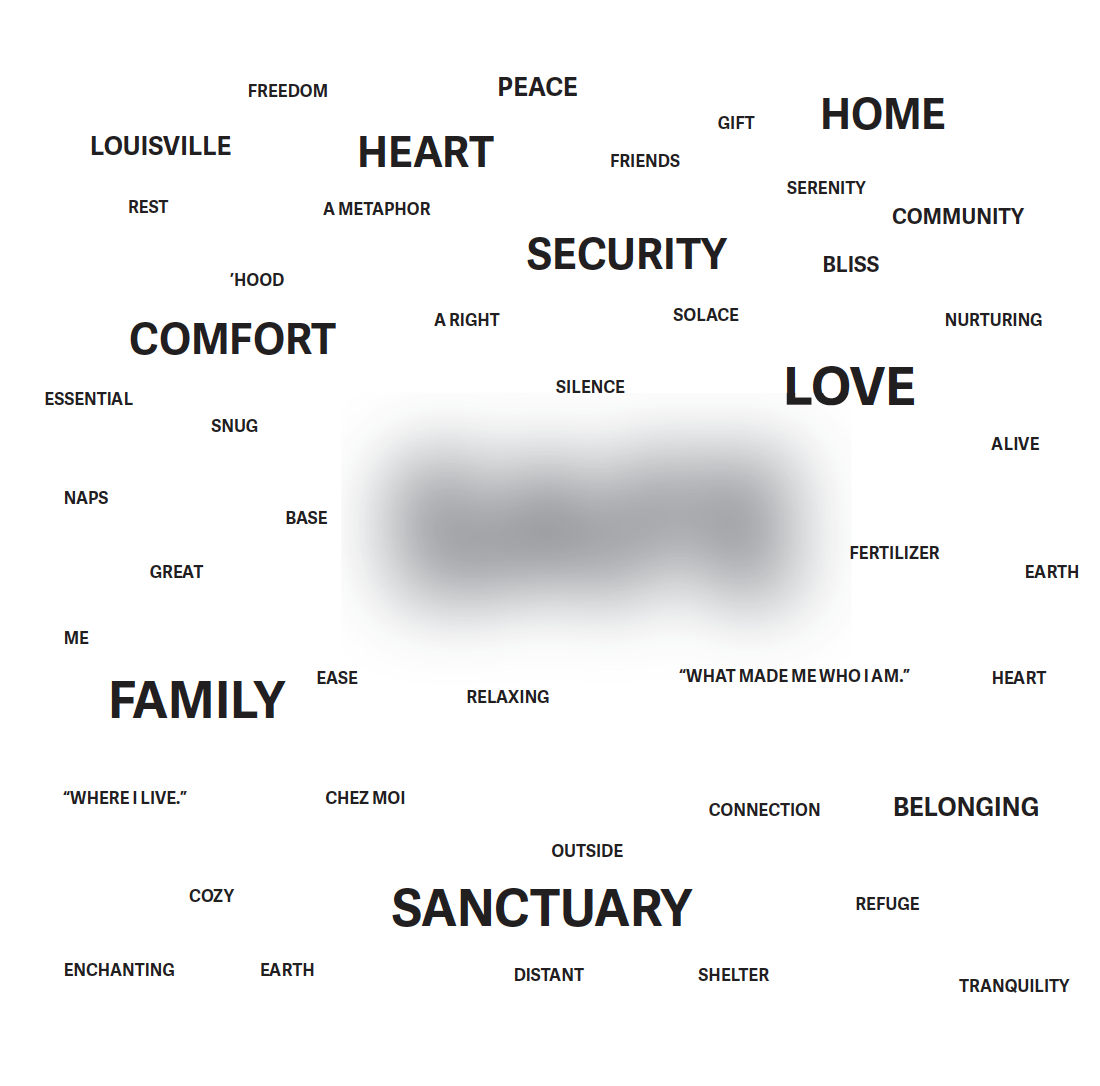
No matter who we talked to — no matter if they’re originally from Louisville, no matter what neighborhood they call home, no matter what they do for a living, no matter their age — the most common answer was…
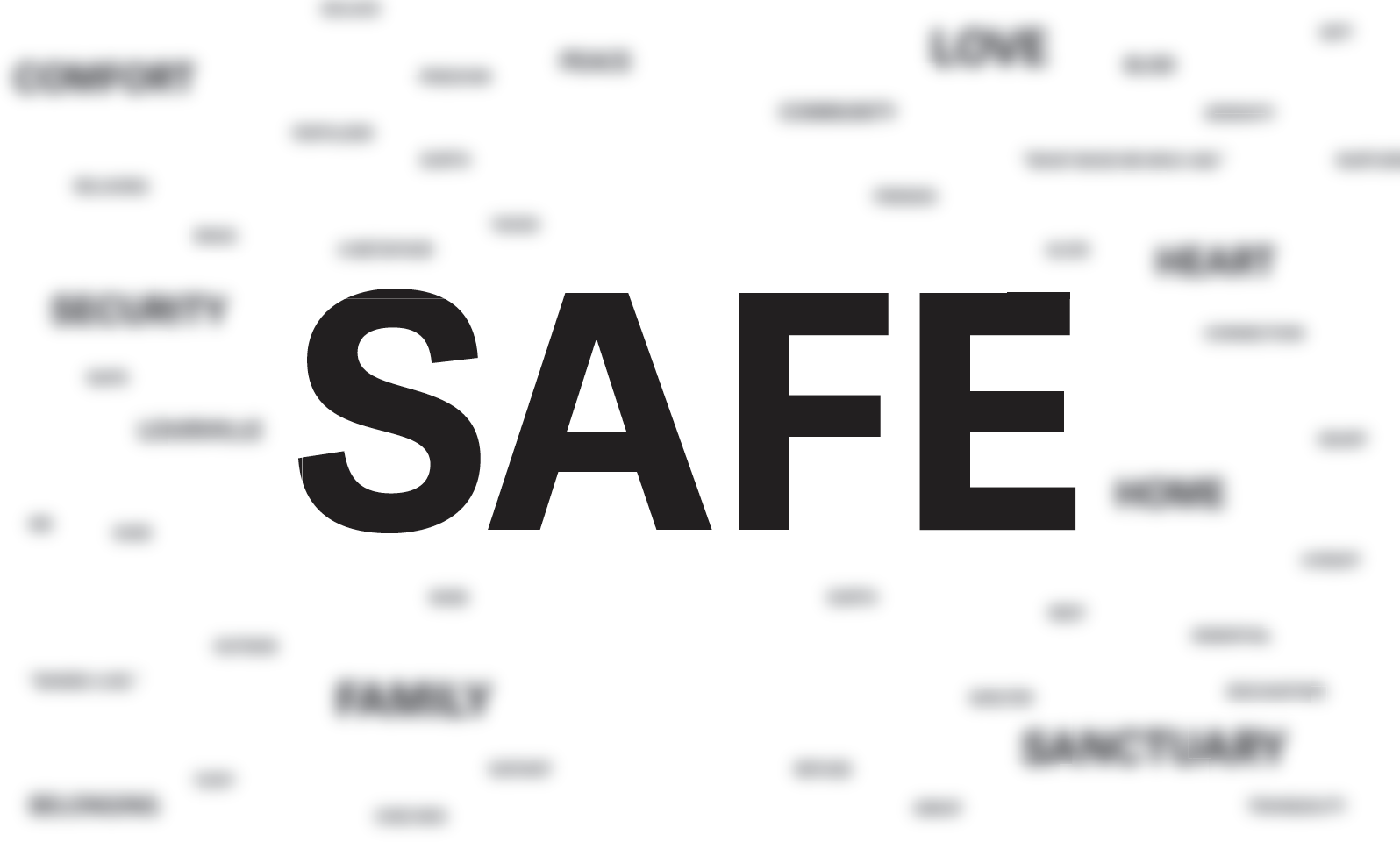
Safe.
The entire globe lived through (is still living through) the pandemic. Home became a refuge, a safe space, in a new way. What set Louisville apart from everywhere else over the past two-plus years, though — except for maybe Minneapolis, where a police officer murdered George Floyd, death by knee to neck — is that our city, after LMPD officers shot and killed Breonna Taylor, became an epicenter for the racial-justice protests. They killed her in her own home. Her refuge. Her safe space. If she wasn’t safe there, she was never safe at all.
In June 2020, when protesters were still flooding our streets every night, Louisville Magazine hosted a socially distant discussion with several local arts leaders, to hear from them about how they were navigating their organizations through the pandemic. Stephen Reily, who hadn’t yet left his role as director of the Speed Art Museum, said something I think of often: “We started talking, about March 12 and 13, and, over about a 24-hour period, we all had to confront decisions to serve public health by closing our organizations. I’m haunted by the fact that that was the same 24-hour period when Breonna Taylor was killed in her home by Louisville police.”
While thinking about Home, I remembered something that Tyler Franklin, a visual media producer at Louisville Public Media, said while working on this issue: “Existence is exhausting, but home is where the batteries get charged, with a door that affords you a sense of privacy and security.”
A door.
In late summer, Breonna Taylor’s boyfriend, Kenneth Walker, contributed an opinion piece to the Washington Post, recounting how LMPD officers took a battering ram to her apartment door in the middle of the night during the botched raid that resulted in her death. Walker wrote, “The memory of that door being forced open is with me constantly and makes it very hard to sleep.”
This August, I had photographer Mickie Winters go to Springfield Drive, not too far from Iroquois Park, to get images of the outside of Taylor’s former home. Mickie texted me: “Wow, no sign at all that anything happened. It feels SO strange here. Hard to explain.”
I know what she means. We want home — our city, our neighborhoods, our households, ourselves — to move forward. We've all been through too much since March 2020. But we can’t forget. We move forward by remembering where we’ve been.

The door to Breonna Taylor’s former apartment, photographed by Mickie Winters on Aug. 2, 2022
